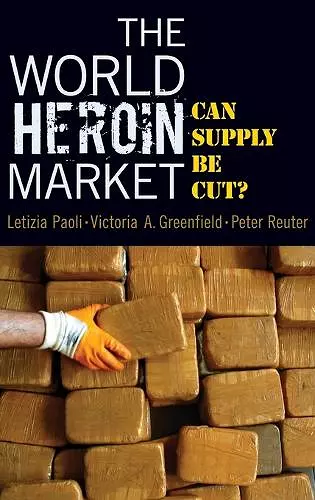The World Heroin Market
Can Supply be Cut?
Peter Reuter author Letizia Paoli author Victoria Greenfield author
Format:Hardback
Publisher:Oxford University Press Inc
Published:28th May '09
Currently unavailable, and unfortunately no date known when it will be back

During 2000-1 in Afghanistan, the Taliban achieved a longtime goal of national and international drug policy agencies: a large, sudden, and unanticipated reduction in world opium production. This cutback provides an unprecedented opportunity to study the dynamics of the world opiate market and ask whether further interventions could effectively reduce the flows of drugs. Based on an extended, multi-national study, the authors construct a new model for the trafficking of drugs and revenues and offer the first account of the world market in heroin and other illicit opiates during and after the 2001 ban. The authors' broader findings demonstrate how robust production, trafficking, and consumption combine to make successful long-term interventions on the supply-side rare exceedingly difficult, though specific policies can impact the organization and behavior of markets. For reductions in both production and consumption, where the cultivation of opium is entrenched in the normal life and legitimate economy of millions of people, international agencies and foreign governments must provide adequate and long-term support to foster both alternative development policies and law enforcement programs.
"An ambitious, multi-disciplinary analysis of the global heroin market in its entirety, representing the culmination of five years of painstaking research...the book stands as an incredibly comprehensive look at the world heroin market and a remarkable contribution to scholarship in the field...quite accessible to the average reader wondering what the global heroin market looks like through the eyes of an economist."--International Law and Politics "A clear-sighted and accessible reference for those trying to understand the international heroin trade and its effects on countries. The book reflects the disciplinary strengths of the author triad; this integration of criminology, economics, and public policy creates a substantial contribution to the literature that should be of strong interest to scholars and practitioners in public policy, criminal justice, economics, and public health...This is an insightful tome on the world heroin trade; one that will be immensely useful to those concerned about the continued facile flows of global heroin. I look forward to rereading and thumbing through this book for years to come."--Asian Journal of Criminology "An unmatched source of information on this topic.... Highly recommended."--CHOICE "Reliable studies of illicit drug markets are rare. Reliable studies of illicit drug markets on a global scale are almost nonexistent. Paoli, Greenfield, and Reuter have pulled off a small miracle of scholarship by giving us a meticulously researched overview of global opiate markets, one that combines economic and policy analysis with rich historical, political, and ethnographic insight."--David Courtwright, author of Dark Paradise and Forces of Habit "Policymakers have long struggled with how to stem the production and international distribution of illegal drugs. The limited successes and numerous failures have not yielded many useful lessons, partly due to a paucity of carefully conducted research. The World Heroin Market provides a systematic, evidence-based analysis that will become essential reading for policymakers seeking to understand and address the heroin problem as well as broader political, economic, and security issues in source and trafficking countries. Afghanistan has put these issues back on the front burner for government leaders, and this work could not be more timely."--William S. Cohen, former U.S. Secretary of Defense "Anyone who thinks nothing changes in drug markets needs to read this book. A wonderful resource, The World Heroin Market documents in a fresh, comprehensive way the global heroin trade to argue that historical shifts in supplies, large as they are, do not transform heroin consumption--markets are resilient globally even if they can be crushed locally, often at a high price. The policy options on the supply side for a world with less drug abuse look limited in light of this sobering, illuminating, book."--John Braithwaite, Australian National University "This long-needed book is based on in-depth research and is the first to give a full overview of the development and composition of, as well as the behavior related to, the illegal business of trading in heroin. The authors very ably demonstrate what a complex problem it is to reduce national and regional opium production. They lay out the crucial conclusion that cross-border cooperation between law enforcement agencies must also be supported by increased awareness within society and by long-term economic development and political institution-building."--Max-Peter Ratzel, Director of Europol "Drugs are sold in markets and so economists ought to have something useful to say about the effects of efforts to control those prohibited substances. Alas, though they have had much to say, it has not been particularly informed by any detailed understanding of how these markets work. In this book two economists and a sociologist have teamed up to make a large contribution to fill that gap for the world heroin market. From this analysis they have deduced important insights about the inherent limits of efforts to suppress heroin production and trafficking."--Thomas Schelling, Nobel Laureate in Economics, University of Maryland
ISBN: 9780195322996
Dimensions: 163mm x 236mm x 31mm
Weight: 666g
392 pages